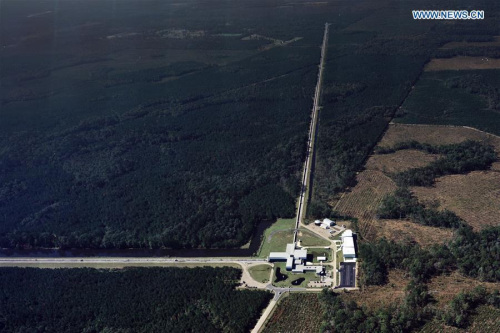
File photo shows the Laser Interferometer Gravitational-wave Observatory (LIGO) in Livingston, Louisiana, the United States. U.S. scientists said Thursday they have detected the existence of gravitational waves, which were predicted by Albert Einstein's theory of general relativity 100 years ago. (Xinhua/Caltech/MIT/LIGO Lab)
Tianqin, China's domestic gravitational wave research project initiated by the Sun Yat-sen University in July 2015, is awaiting governmental approval.
The U.S.-based Laser Interferometer Gravitational-wave Observatory (LIGO) announced its ground-breaking discovery of gravitational waves on Thursday, which fulfilled the prediction of Albert Einstein's general theory of relativity one century ago.
The new discovery has encouraged further studies into gravitational waves around the world, with China accelerating its domestic research, said Li Miao, dean of the Institute of Astronomy and Space Science of the university in south China's Guangdong Province.
According to Li, Tianqin has already made progress on some key technologies and will be carried out in four stages over the next 15 to 20 years, including the last step of launching three high-orbit satellites to detect gravitational waves.
The university plans to build a 5,000-square-meter observatory and a new lab occupying more than 10,000 square meters on Fenghuang Mountain in Zhuhai City, Guangdong Province.
Chen Yanbei, scientist with LIGO, said Tianqin will study the gravitational waves in the space, which is different from research made by the U.S. ground-based observatory.
"Tianqin will likely collect more information about the phenomenon, as a larger black hole may be detected in space compared with one detected on the ground," said Chen.
Sun Yat-sen University is willing to cooperate with other institutions in China as well as around the globe to carry out its project, Li added.


















































